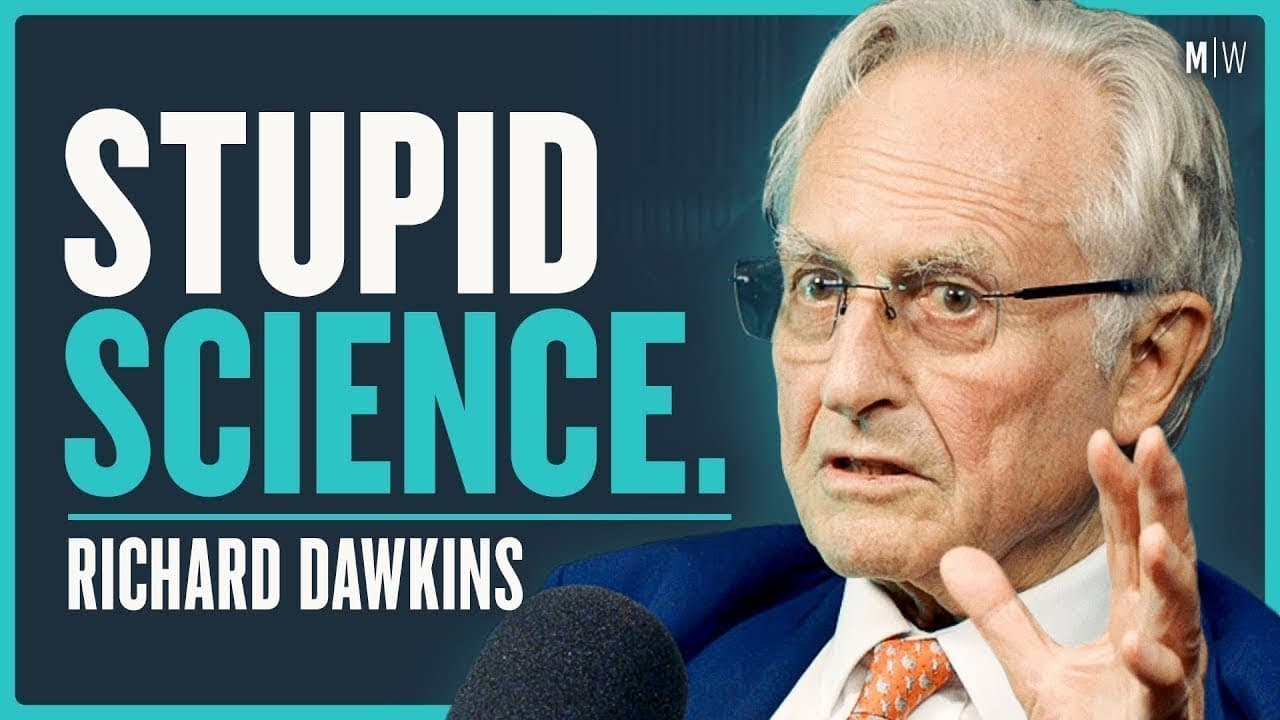Why Can No One Agree On Evolution, Race & Religion? - Richard Dawkins
26 Sep 2024 (1 year ago)

The Rise of Cultural Christianity (0s)
- Cultural Christianity refers to individuals raised in a Christian culture, regardless of their beliefs. (16s)
- The recent surge in traditional religious practices, particularly among young people, is noteworthy. (59s)
- Trends in societal beliefs, including religious affiliations, are constantly evolving. (2m23s)
Dealing With a Shattered Worldview (2m44s)
- It is disrespectful to assume humans need a crutch, such as religion, to get through life. (3m48s)
- Many people are turning away from religion without turning to other irrational beliefs. (5m2s)
- It is important to understand that human psychology is often irrational, even when presented with rational arguments and evidence. (4m13s)
Why Religion Arises in Every Culture (5m13s)
- Religion, like convergent evolution, appears independently in various cultures around the world. (6m38s)
- Humans have an innate desire to understand the world around them, leading to supernatural explanations when scientific understanding is lacking. (6m57s)
- The tendency to attribute events to conscious agents, rather than natural forces, likely stems from our ancestors' need to be wary of predators and other dangers. (8m18s)
Biological Sex is an Obvious Binary (10m47s)
- Human characteristics like height, weight, and skin color exist on a spectrum. (11m4s)
- Sex is argued to be binary, similar to a bimodal distribution with two distinct peaks representing male and female. (11m17s)
- While acknowledging the existence of intersex individuals, the frequency of such cases is statistically insignificant, comparable to a molehill next to twin towers. (15m10s)
Race From an Evolutionary Perspective (18m1s)
- Blending inheritance, a popular belief in Victorian times, suggested offspring inherit an average of their parents' traits, leading to a loss of variation over generations. (18m19s)
- Race appears to exhibit blending inheritance, with multiracial individuals often displaying intermediate features, but this is due to the additive effects of multiple genes (polygenes), not the blending of genetic material itself. (21m40s)
- The speaker finds it paradoxical that society is more accepting of transgender individuals than those who identify as transracial, despite race being a spectrum and sex being biologically determined. (23m40s)
Is Social Justice a Replacement for Religion? (25m43s)
- Some people theorize that the decline of religiosity and the rise of identity politics are connected, suggesting people are seeking meaning elsewhere. (25m46s)
- It has been suggested that those who oppose Christianity are responsible for opening the door to new forms of irrationality. (26m5s)
- While some argue that humans are predisposed to seek meaning and answers, potentially explaining the shift from religion to social justice activism, this idea is not universally accepted. (26m59s)
Darwin’s Marriage Wish List (28m4s)
- Charles Darwin created a list of pros and cons of marriage, ultimately deciding in favor of it. (28m6s)
- Darwin's reasons for marriage included companionship, children, and someone to care for the house, while his reasons against it included loss of freedom, time for work, and potential financial strain. (28m47s)
- The discussion transitions to modern societal trends, noting a decline in marriage and birth rates, with some young people expressing disinterest in dating. (30m22s)
Richard’s Message to Evolution Sceptics (33m50s)
- It is difficult to have a rational explanation for the complexity of life without believing in evolution, and those who do not believe in evolution while identifying as atheists likely have not given the matter much thought. (35m10s)
- Strong evidence for evolution can be found in the geographic distribution of species, such as the prevalence of marsupials in Australia with few to no fossil records of their migration to the continent. (36m22s)
- Molecular genetics provides further evidence for evolution, as DNA sequencing reveals a hierarchical pattern consistent with a branching family tree, with the closeness of genetic sequences reflecting evolutionary relationships. (37m5s)
The Link Between Primates & Humans (40m56s)
- There are many fossils of ancestral humans in Africa. (41m38s)
- Australopithecus were upright walking primates with brains about the size of a chimpanzee's. (42m50s)
- Homo floresiensis, found on the island of Flores in Indonesia, were a smaller version of early humans. (44m21s)
Biology’s View of Consciousness (45m49s)
- Consciousness is a biological problem that is yet to be fully understood. (46m27s)
- There is no definitive answer to what a theory of consciousness would look like. (46m59s)
- Some argue that consciousness is not necessary for survival and reproduction, citing the example of potentially unconscious robots controlled by advanced AI. (48m33s)
Why Behavioural Genetics is Still Controversial (51m42s)
- Behavioral genetics is a flourishing field of study. (52m31s)
- There is pushback against behavioral genetics, potentially due to its perceived proximity to eugenics. (52m57s)
- Some people are resistant to the idea of heritability explaining behavior while simultaneously accepting the role of genetics in animal breeding. (54m0s)
The Ethics of Embryo Selection & Manipulation (54m16s)
- It is suggested that instead of random selection, in-vitro fertilization (IVF) could be used to non-randomly choose embryos without hereditary diseases like hemophilia. (55m11s)
- Iceland is said to have eradicated Down syndrome; however, it is clarified that Down syndrome is not hereditary and therefore not a product of eugenics. (56m1s)
- A possible ethical concern is raised about the potential for economic disparity in accessing IVF and genetic selection technologies. (59m21s)
- The discussion explores the ethics of "tinkering" with genetic code, with acknowledgment of a potential "naturalistic fallacy" in objecting to such manipulation. (1h1m47s)
- It is posited that a sperm's haploid genotype does not influence its phenotype, implying that selection against weaker sperm would not necessarily result in stronger offspring. (1h3m4s)